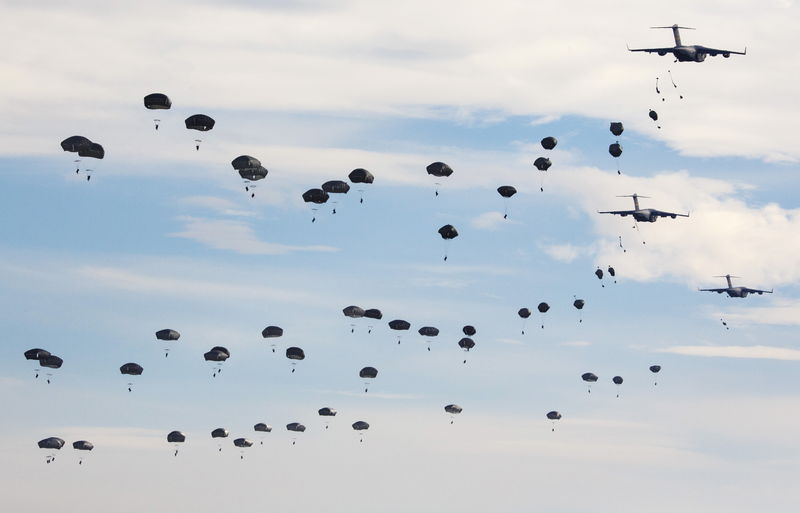By Susan Heavey and Steve Holland
WASHINGTON (Reuters) - Republican presidential candidates vowed on Monday to take a tougher approach toward Islamic State militants, with Jeb Bush saying a larger Middle East troop presence is needed and Donald Trump saying he would consider closing some mosques in the United States.
The impact of Friday's attacks in Paris on the U.S. campaign for the November 2016 presidential election has been swift and powerful, with national security thrust back to the top of voter concerns.
In a Reuters/Ipsos poll of 1,483 U.S. adults conducted after the attacks, 63 percent said a Paris-style assault could happen near them, and 60 percent said more should be done to counter Islamic State.
But a strong majority reflected America's war weariness after 14 years of conflict since the Sept. 11, 2001, attacks. The poll found 76 percent opposed sending regular ground troops to the region.
Republicans competing for their party's presidential nomination sounded out a variety of themes to appeal to conservatives who feel President Barack Obama's reliance on air strikes to counter the rise of Islamic State has been weak.
They called for more troops on the ground in the Middle East, a no-fly zone over Syria and better coordination with allies after the attacks in Paris that killed 129 people at a concert, restaurants and other locations.
Trump, the billionaire businessman who has promised to deport every illegal immigrant in the United States and leads the Republican field in most polls, went perhaps the furthest in saying he would consider shutting down mosques to prevent Muslims in the United States from becoming radicalized.
"I would hate it do it, but it's something that you're going to have to strongly consider because some of the ideas and some of the hatred, the absolute hatred, is coming from these areas," Trump said.
Obama, who has been adamant about limiting the number of American ground troops and U.S. casualties, told a news conference after a G-20 summit in Turkey that it would be a mistake for the United States to switch its strategy and put U.S. troops in combat against Islamic State.
Bush, the former Florida governor who is set to give a national security speech on Wednesday in South Carolina, said American troops could provide leadership in the fight against Islamic State in Syria and Iraq, but did not call for a massive reintroduction of U.S. troops into Iraq.
Bush faces a challenge to sound tough on terrorism without seeming too much like his brother, former President George W. Bush, who ordered the 2003 U.S. invasion of Iraq.
Jeb Bush wants a no-fly zone over Syria and a more aggressive U.S. diplomatic effort to build an international coalition, and he said more U.S. troops should be embedded with the Iraqi military, provide more training for Kurdish peshmerga forces and work more with Sunni tribal leaders.
"We can't do this alone ... but we can lead," Bush said.
Trump also said he backed some U.S. troops, perhaps 10,000, in the region but would instead focus on targeting Islamic State's oil and banking operations.
Retired neurosurgeon Ben Carson, another Republican contender, said the right number of troops was "whatever the Pentagon says they need to accomplish that mission."
RESETTLE REFUGEES
The Republican candidates raised concerns about Obama's plan to bring into the United States as many as 10,000 refugees fleeing Syria. They said militants entering the country as refugees could pose a threat, after reports that one of the Paris attackers might have traveled with a group of refugees.
"There simply is not a way to vet these refugees," said Carson, calling for any funds for resettling refugees to be withheld.
Louisiana Governor Bobby Jindal, a low-polling Republican candidate, said he had suspended any settlement of Syrian refugees in his state, as other governors have done.
Bush called for special protections for Syrian Christians fleeing to the United States.
"We should focus on creating safe havens for refugees in Syria rather than bringing them all the way across to the United States," Bush told MSNBC.
Obama said it was "shameful" to consider giving Christian refugees preference over other families seeking to escape violence. Carson said religious tests were inappropriate, but he said the United States could conduct "ideological" tests.
U.S. Senator Lindsey Graham, the most hawkish on military action, called on Obama to coordinate military efforts with the French and allies in the Middle East to combat the militants.
U.S. Senator Ted Cruz released a television ad in which he said that if he becomes president, "enemies across this world will know the United States is not to be trifled with." Ohio Governor John Kasich will discuss national security on Tuesday in Washington.

For more on the 2016 U.S. presidential race and to learn about the undecided voters who determine elections, visit the Reuters website (http://www.reuters.com/election2016/the-undecided/).